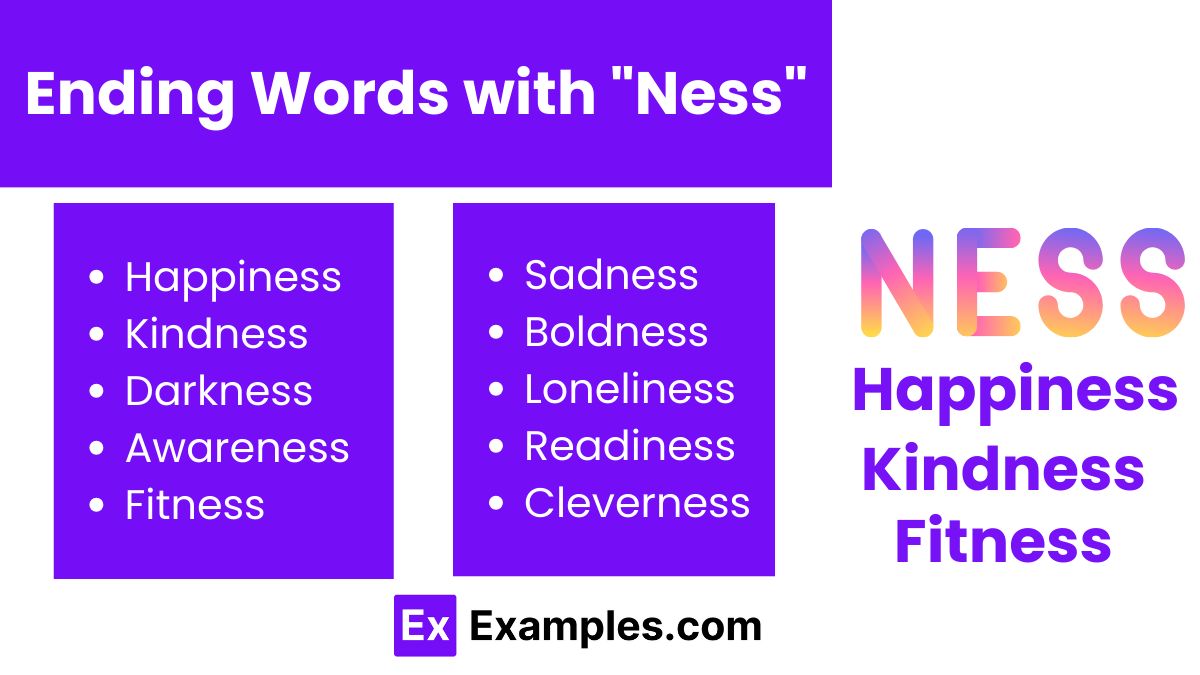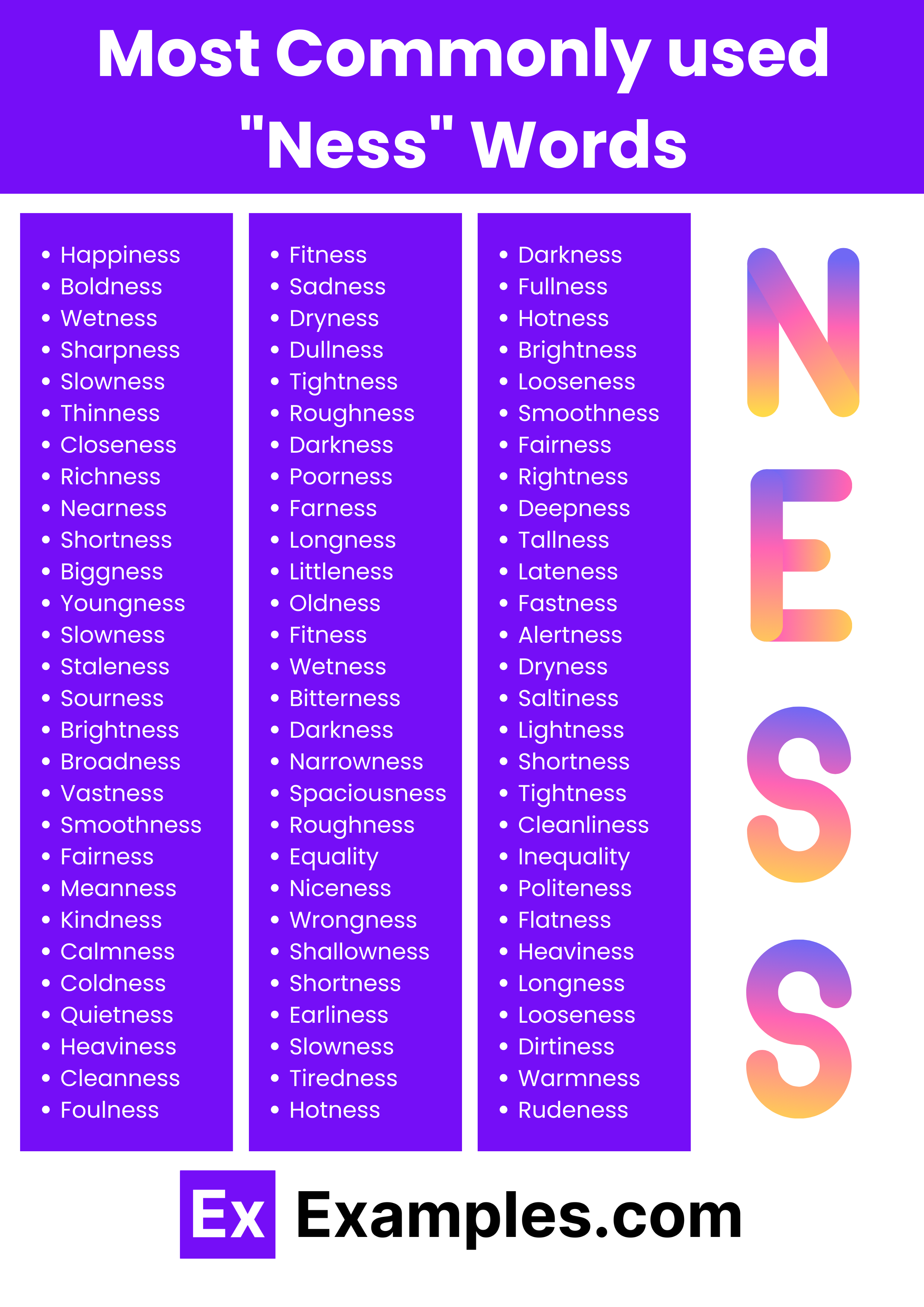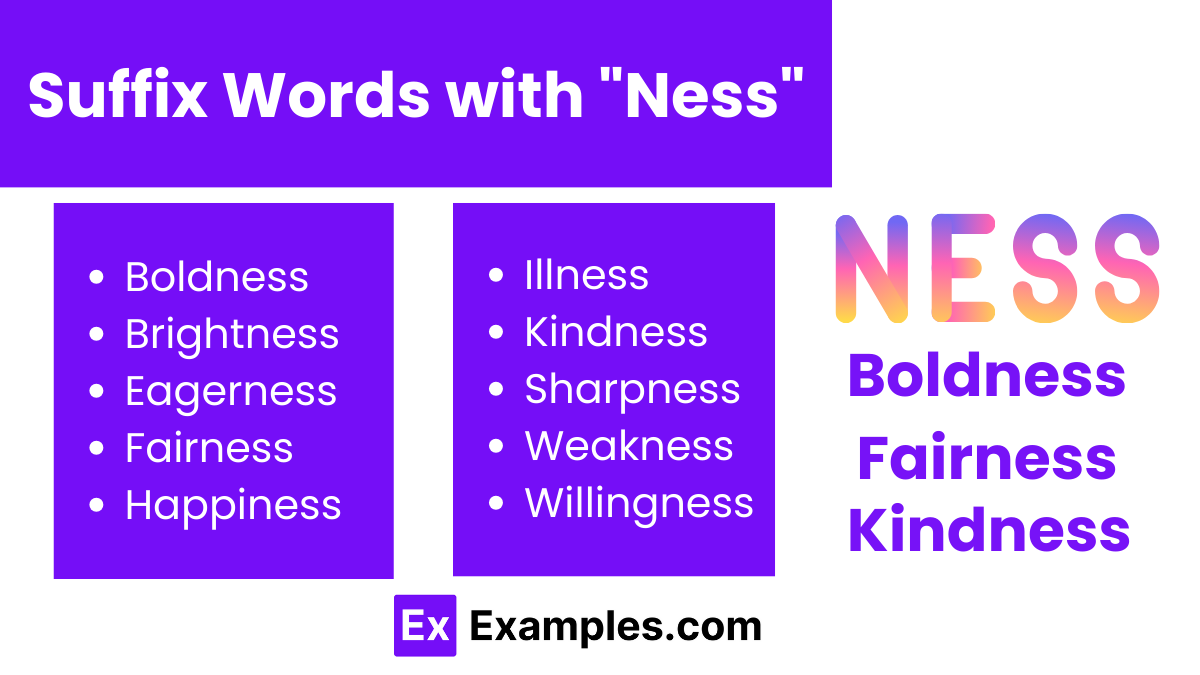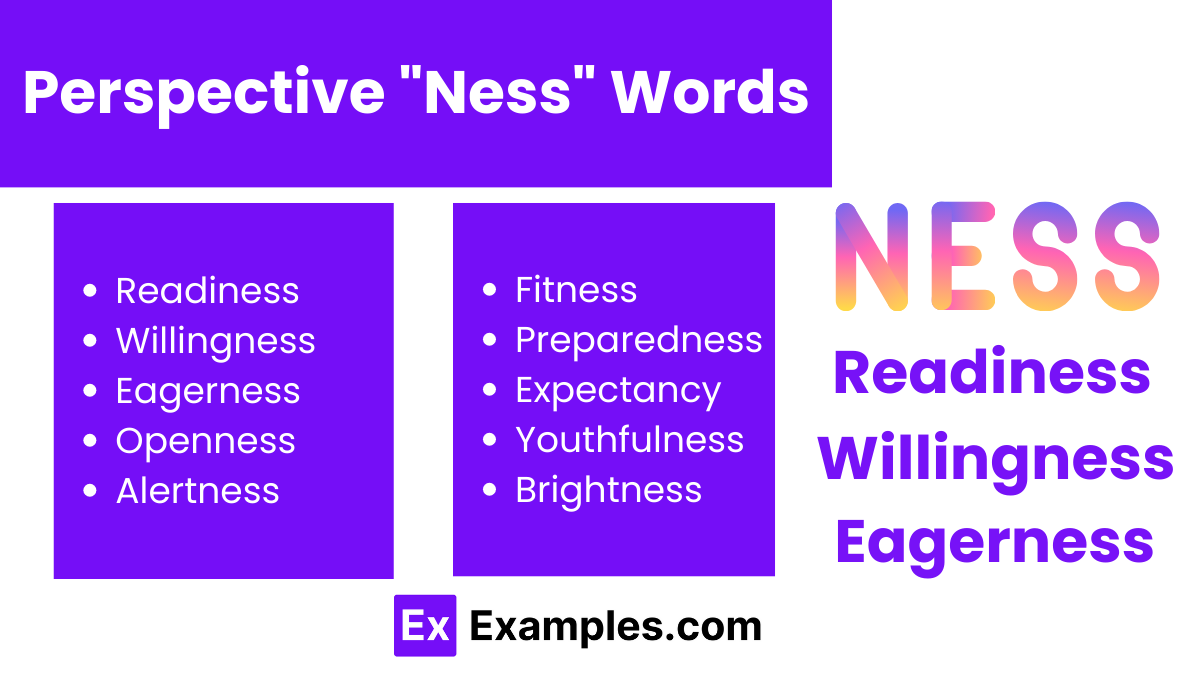450+ Ness Words List, Meaning, PDF
The suffix “ness” plays a pivotal role in the English language, transforming adjectives into nouns that encapsulate qualities, states, or conditions, thus offering a window into the abstract. This linguistic mechanism enriches our vocabulary, allowing for the expression of intricate emotions, characteristics, and experiences with nuance and depth. Whether discussing the tangible darkness of the night or the intangible happiness that brightens our days, “ness” words provide a framework for articulating the complexities of our world. For educators, these words are invaluable tools for developing students’ descriptive abilities, enhancing their communication skills, and fostering a deeper understanding of language’s power to shape perceptions. As we explore the realm of “ness” words, we delve into the essence of human experience, capturing the subtleties that define our interactions, thoughts, and feelings.
Download Most Commonly used Ness Words - PDF
Most Commonly used “Ness” Words
| Happiness | Fitness | Darkness | Kindness | Wellness | Sickness |
| Boldness | Sadness | Fullness | Calmness | Warmness | Coolness |
| Wetness | Dryness | Hotness | Coldness | Softness | Hardness |
| Sharpness | Dullness | Brightness | Quietness | Loudness | Quickness |
| Slowness | Tightness | Looseness | Heaviness | Lightness | Thickness |
| Thinness | Roughness | Smoothness | Cleanness | Dirtiness | Openness |
| Closeness | Darkness | Fairness | Foulness | Goodness | Badness |
| Richness | Poorness | Rightness | Wrongness | Highness | Lowness |
| Nearness | Farness | Deepness | Shallowness | Wideness | Narrowness |
| Shortness | Longness | Tallness | Shortness | Greatness | Smallness |
| Biggness | Littleness | Lateness | Earliness | Newness | Oldness |
| Youngness | Oldness | Fastness | Slowness | Quickness | Readiness |
| Slowness | Fitness | Alertness | Tiredness | Weariness | Freshness |
| Staleness | Wetness | Dryness | Hotness | Coldness | Sweetness |
| Sourness | Bitterness | Saltiness | Flatness | Sharpness | Dullness |
| Brightness | Darkness | Lightness | Heaviness | Thinness | Thickness |
| Broadness | Narrowness | Shortness | Longness | Highness | Lowness |
| Vastness | Spaciousness | Tightness | Looseness | Softness | Hardness |
| Smoothness | Roughness | Cleanliness | Dirtiness | Openness | Closeness |
| Fairness | Equality | Inequality | Warmness | Coolness | Kindness |
| Meanness | Niceness | Politeness | Rudeness | Happiness | Sadness |
7 Letters “Ness” Words
The beauty of the English language is showcased through its versatility and depth, particularly with the use of the suffix “ness.” This powerful suffix transforms adjectives into nouns, encapsulating qualities, states, or conditions with precision and clarity. For educators looking to enrich their students’ vocabulary, “ness” words offer a gateway to a more nuanced understanding of language and its ability to convey the subtleties of human experience and perception. These words are not just vocabulary items; they are tools for expression, critical thinking, and creativity. Below is a list of 10 7-letter “ness” words, each accompanied by a brief definition to aid in comprehension and usage.
- Dimness – The state or quality of being poorly lit or lacking in brightness.
- Gayness – The state or quality of being cheerful and lively; in modern context, it also refers to sexual orientation towards the same sex.
- Knesset – The national legislature of Israel.
- Lowness – The quality or state of being low in position, rank, quality, or degree.
- Madness – The state of being mentally ill, especially severely, or extremely foolish behavior.
- Newness – The quality or state of being new, novel, or unused.
- Nowness – The quality of being current or of the present; immediacy.
- Rumness – Unusualness or oddity (Note: “Rumness” is not a standard word, but “rum” can mean strange or odd, making “rumness” a derivation that suggests the quality of being strange).
- Shyness – The quality or state of feeling nervous or timid in the presence of others.
- Wanness – The quality of being pale or lacking in color, often due to illness or faintness.
8 Letters “Ness” Words
Diving into the realm of “ness” words expands our linguistic toolkit, offering a nuanced lens through which we can examine and articulate the myriad states and qualities that color human experience. These 8-letter “ness” words are a testament to the English language’s capacity for precision, allowing speakers and writers to convey specific states or qualities with clarity. For educators, these terms are invaluable for enriching students’ vocabularies and enhancing their descriptive abilities. By exploring these words, students not only build their linguistic repertoire but also develop a deeper appreciation for the subtleties of expression and comprehension. Here are 10 carefully selected 8-letter “ness” words, each defined to illuminate its particular shade of meaning.
- Laziness – The quality of being unwilling to work or use energy; idleness.
- Packness – Not a standard English word; could imply the quality of being packed or dense.
- Pixiness – The quality of being like a pixie; whimsical or mischievous.
- Waxiness – The quality of being like wax in texture or appearance.
- Zaniness – The quality of being zany; amusingly unconventional and idiosyncratic.
- Campness – The quality of being exaggeratedly theatrical or intentionally humorous in style or manner.
- Muchness – The quality of being great in quantity, extent, or degree.
- Ooziness – The quality of being soft and moist, often in a way that is unpleasant.
- Siziness – The quality of having a sticky or semi-liquid texture; not commonly used in standard English.
- Chicness – The quality of being stylish and fashionable.
9 Letters “Ness” Words
The suffix “ness” transforms adjectives into nouns that embody qualities, states, or conditions, offering a mirror to the multifaceted nature of our experiences and perceptions. These 9-letter “ness” words are linguistic gems that enrich dialogues, narratives, and texts by providing precise terms for complex concepts. For educators, they are invaluable in teaching the nuances of language, encouraging students to articulate their thoughts and feelings with greater clarity and depth. Engaging with these words not only expands vocabulary but also deepens comprehension of the abstract dimensions of our world. Here is a list of 10 9-letter “ness” words, each followed by a brief definition to foster understanding and communication.
- Craziness – The state of being mentally unstable or the quality of being wildly foolish.
- Gauziness – The quality of being light, thin, and translucent, like gauze.
- Wooziness – The state of feeling faint, dizzy, or unsteady.
- Blackness – The quality or state of being black in color; often used metaphorically to denote darkness or depth.
- Bluffness – The quality of being direct and outspoken; sometimes, the quality of being good-naturedly frank and straightforward.
- Dazedness – The state of being stunned or bewildered, often as a result of shock or surprise.
- Fixedness – The quality of being fixed, stable, or unchanging; immobility.
- Jadedness – The state of being tired, bored, or lacking enthusiasm, typically after having had too much of something.
- Sharpness – The quality of having a fine edge or point.
- Readiness – The quality of having a red color or appearance.
10 Letters “Ness” Words
Exploring 10 letters “ness” words offers an enriching opportunity to delve into the vastness of the English language. Words ending in “ness” transform adjectives into nouns, encapsulating states or qualities, making them essential for expressive and nuanced communication. This specific category of words enriches learners’ vocabularies, enabling them to articulate feelings, conditions, and characteristics with greater precision. For educators, students, and language enthusiasts, understanding and utilizing these 10-letter “ness” words can significantly enhance written and spoken language skills.
- Brightness – The quality of being filled with light; vivid or brilliant.
- Cleverness – The quality of being intelligent and able to learn quickly.
- Darkiness – The absence of light.
- Eagerness – A keen or ardent interest in something.
- Fistedness – The condition of being physically healthy and strong.
- Greatness – The quality of being large in size, skill, achievement, or power.
- Harshness – The quality of being unpleasantly rough or jarring to the senses.
- Lavishness – The quality of being unwilling to work or use energy.
- Readiness – The state of being fully prepared for something.
- Alertness – The state of being vigilant and aware.
11 Letters “Ness” Words
Exploring 11-letter “ness” words offers a fantastic opportunity to delve into the vastness of the English language, enhancing vocabulary and comprehension skills. These words, characterized by the suffix “ness,” turn adjectives into nouns, encapsulating states, qualities, or conditions, thereby enriching language expression and understanding.
- Abusiveness – Characterized by harmful or violent behavior towards others.
- Adaptedness – The state of being adjusted or suited to new conditions.
- Adverseness – The quality of being unfavorable or detrimental.
- Advisedness – Reflecting careful thought or advice.
- Agelessness – The quality of not showing effects of aging; timeless.
- Aimlessness – Lacking direction or purpose.
- Airlessness – The state of having no airflow; stuffy or stagnant.
- Airsickness – Nausea caused by air travel.
- Amativeness – Showing or inclined to romantic affection.
- Amiableness – The quality of being friendly and pleasant.
12 Letters “Ness” Words
Exploring 12-letter ‘ness’ words opens up a fascinating aspect of English vocabulary, focusing on the richness and diversity of adjectives turned into nouns by adding the suffix “ness.” This suffix transforms verbs and adjectives into nouns, emphasizing a state or quality, thus enriching our language with detailed descriptors of conditions or attributes.
- Globularness – The quality of being spherical or ball-shaped.
- Backwardness – The state of being behind in development or progress.
- Forsakenness – The condition of being abandoned or deserted.
- Baselessness – Lacking a solid foundation or justification.
- Dioicousness – Pertaining to a plant species having male and female reproductive organs on separate individuals.
- Canorousness – Having a pleasant and melodious sound; musical.
- Debonairness – The quality of being confident, stylish, and charming.
- Affluentness – The state of having a great deal of wealth or abundance.
- Effusiveness – The quality of expressing feelings of gratitude, pleasure, or approval in an unrestrained or heartfelt manner.
- Cumbrousness – Being cumbersome or difficult to handle due to weight or size.
13 Letters “Ness” Words
By focusing on such words, learners can delve deeper into the complexities of English, appreciating its capacity to convey precise emotional states, qualities, and conditions with clarity and depth. Incorporating these words into one’s vocabulary elevates language use, making it more vivid and expressive. It’s an excellent way for educators, students, and language enthusiasts to challenge themselves and expand their linguistic repertoire.
- Acceptingness – The quality of being accepting.
- Crapulousness – The state of being excessive in eating or drinking.
- Heartlessness – The lack of sympathy or compassion.
- Colorableness – The appearance of authenticity or plausibility.
- Barbarousness – The state of being cruel or primitive.
- Deliriousness – The condition of being in a state of delirium.
- Dauntlessness – The quality of being fearless and determined.
- Allowableness – The state of being permissible or acceptable.
- Delightedness – The state of being filled with delight.
- Execrableness – The quality of being detestable or abhorrent.
14 Letters “Ness” Words
Diving into the realm of 14-letter ‘ness’ words provides an extraordinary opportunity to appreciate the intricacy and expressiveness of the English language. These words, characterized by their specific length and the suffix “ness,” highlight the ability to describe states, qualities, or conditions in a nuanced and detailed manner. Understanding and using these terms allows for more precise and evocative communication.
- Abominableness – The state of being extremely unpleasant or detestable.
- Confoundedness – The condition of being confused or perplexed.
- Disdainfulness – The quality of showing contempt or lack of respect.
- Boneheadedness – The state of being unbelievably stupid or thickheaded.
- Accessibleness – The quality of being easy to reach, approach, or understand.
- Disgustingness – The condition of being repulsive or offensive.
- Disjointedness – The quality of being disorganized or lacking coherence.
- Emphaticalness – The state of expressing something forcibly and clearly.
- Fuliginousness – The quality of being sooty or smoky.
- Heathenishness – The state of being uncivilized or barbaric.
15 Letters “Ness” Words
Exploring 15 letter ‘ness’ words unveils the breadth and depth of English vocabulary, demonstrating how suffixes like “ness” transform adjectives into nouns that describe states, qualities, or conditions with great specificity. This linguistic feature enriches communication, allowing speakers and writers to convey complex ideas and emotions with precision.
- Mischievousness – The quality of being playfully naughty or troublesome.
- Acquisitiveness – The excessive interest in acquiring money or material things.
- Acrimoniousness – The quality of being angry and bitter.
- Correlativeness – The state of being related or connected to something else.
- Flirtatiousness – The quality of flirting or behaving in a way that suggests a playful romantic interest.
- Informativeness – The quality of providing useful or interesting information.
- Justifiableness – The state of being able to be shown as right or reasonable.
- Kindheartedness – The quality of being kind and caring.
- Inheritableness – The quality of being capable of being inherited.
- Exaggeratedness – The state of being exaggerated beyond truth or reasonableness.
Ending Words with “Ness”
Exploring words ending with “ness” unveils the depth and adaptability of the English language, enriching our vocabulary with nouns that describe states, qualities, or conditions. These suffixes transform adjectives into abstract nouns, allowing us to express nuances and complexities of human experience, emotion, and observation. Incorporating “ness” words into our lexicon not only enhances descriptive language but also fosters a deeper understanding of the subtleties of communication. Ideal for educators aiming to broaden students’ vocabulary, this list emphasizes the importance of these words in articulating precise thoughts and feelings. Here are 10 “ness” words, each followed by a brief definition to illuminate their meanings:
- Happiness – The state of being happy.
- Kindness – The quality of being friendly, generous, and considerate.
- Darkness – The absence of light.
- Awareness – Knowledge or perception of a situation or fact.
- Fitness – The condition of being physically fit and healthy.
- Sadness – The condition of experiencing sorrow or unhappiness.
- Boldness – The quality of having a strong, vivid, or clear appearance.
- Loneliness – The state of being alone and feeling sad about it.
- Readiness – The state of being fully prepared for something.
- Cleverness – The quality of being intelligent and able to learn quickly.
Suffix Words with “Ness”
The suffix “ness” is a magical linguistic element that transforms adjectives into nouns, capturing qualities, states, or conditions with clarity and depth. This transformation allows for the expression of abstract concepts and emotions, making “ness” words essential in both spoken and written English. These nouns offer a lens through which we can explore and articulate the human experience with greater nuance. For educators, understanding and teaching “ness” words is crucial in developing students’ abilities to express themselves clearly and empathetically. By integrating these words into their vocabulary, students can enhance their descriptive writing and critical thinking skills, opening up new avenues for communication and expression. Here are 10 “ness” words, each a building block for a richer, more detailed understanding of the world:
- Boldness – The quality of being brave and confident.
- Brightness – The quality of giving out or reflecting light.
- Eagerness – Enthusiasm to do or to have something.
- Fairness – The quality of making judgments that are free from discrimination.
- Happiness – The state of being happy.
- Illness – A state of being sick or unhealthy.
- Kindness – The quality of being friendly, generous, and considerate.
- Sharpness – The quality of having a fine or keen edge or point.
- Weakness – The state or condition of lacking strength.
- Willingness – The quality of being prepared to do something.
Perspective “Ness” Words
The concept of “Perspective ness words” invites us to explore terms that embody qualities, states, or conditions with a forward-looking or anticipatory perspective. These words enrich our language with the ability to describe potential or expected states, offering a glimpse into future possibilities or dispositions. Ideal for educators seeking to broaden students’ horizons, this list encourages a deeper understanding of how language shapes our perception of the future and our expectations. Here are 10 “Perspective ness” words, each with a definition that captures a forward-looking or anticipatory quality:
- Readiness – The state of being fully prepared for something.
- Willingness – The quality of being ready to do something voluntarily.
- Eagerness – Intense enthusiasm or desire to do or to have something.
- Openness – The quality of being open and receptive to new ideas or changes.
- Alertness – The state of being vigilant and aware of one’s surroundings.
- Fitness – The condition of being physically fit and prepared, often for specific challenges or activities.
- Preparedness – The state of being prepared, especially for potential challenges or disasters.
- Expectancy – The state of thinking or hoping that something, especially something pleasant, will happen.
- Youthfulness – The quality of being young or seeming young, often implying vigor and a forward-looking perspective.
- Brightness – The quality of being intelligent and quick to learn, suggesting a promising future.
Delving into the world of ‘ness’ words is an enriching experience that broadens linguistic horizons and deepens understanding of English vocabulary. These words, with their specific nuances and descriptive power, offer a unique opportunity to explore the complexity of language, enhancing both written and spoken communication skills. Encouraging their use can transform ordinary language into a more vivid and expressive tool.






